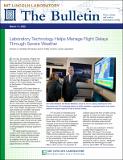| dc.date.accessioned | 2022-11-10T18:54:04Z | |
| dc.date.available | 2022-11-10T18:54:04Z | |
| dc.date.issued | 2022-11-10 | |
| dc.identifier.uri | https://hdl.handle.net/1721.1/146344 | |
| dc.description.abstract | Historically, air traffic controllers (ATCs) have relied on past experience and looked at weather forecasts themselves to understand and prepare in advance for weather that could impact the flow of traffic. A MIT Lincoln Laboratory-developed technology called the Traffic Flow Impact (TFI) tool aims to help ATCs make detailed plans in advance using machine learning. The tool, which began development in 2013 and recently won an R&D 100 Award, utilizes multiple weather forecast models from the National Oceanic and Atmospheric Administration and machine learning to analyze the different forecast models. It also considers historical data of how traffic has been interrupted by weather in order to provide a breakdown of how ATCs may want to adjust the flow of traffic. | en_US |
| dc.language.iso | en_US | en_US |
| dc.relation.ispartofseries | The Bulletin; | |
| dc.rights | Attribution-NoDerivs 3.0 United States | * |
| dc.rights.uri | http://creativecommons.org/licenses/by-nd/3.0/us/ | * |
| dc.subject | MIT Lincoln Laboratory | en_US |
| dc.subject | LLSC | en_US |
| dc.subject | Supercomputing | en_US |
| dc.subject | Machine Learning | en_US |
| dc.title | Laboratory Technology Helps Manage Flight Delays Through Severe Weather | en_US |
| dc.type | Article | en_US |
